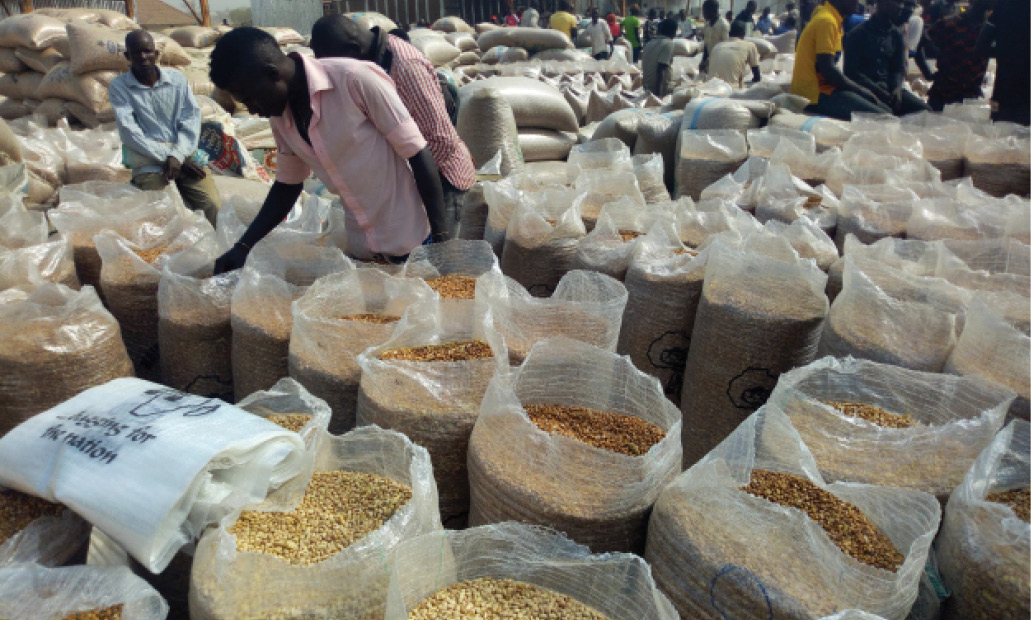How IDPs become major beans producers
…a tale of the unbroken spirit of IDPs farmers One of the farming communities in Nasarawa State that is gradually being hedged in by urbanisation is Auta-Ballefi. Arguably, the community is one of the biggest beans market, thanks to the enormous contributions of Internal Displaced Peoples that settled there. The gateway community, which is […]

…a tale of the unbroken spirit of IDPs farmers
One of the farming communities in Nasarawa State that is gradually being hedged in by urbanisation is Auta-Ballefi.
Arguably, the community is one of the biggest beans market, thanks to the enormous contributions of Internal Displaced Peoples that settled there.
The gateway community, which is located about 12 miles from the Federal Capital Territory, along Abuja-Keffi Expressway in Karu Local Government Area of the state, is host to many Internally Displaced Persons from Borno State.
Daily Trust visited the community and interacted with many of the IDPs, who are mostly from Gwoza, a border town about 84 miles south-east of Maiduguri, the Borno State capital.
Before the town was overran by Boko Haram insurgents in 2014, the people were essentially beans farmers with farms spread along the borders with Chad.
But with the sacking of their villages, many ended up in Abuja, staying in makeshift camps, uncompleted buildings, motor parks among others.
These IDP farmers decided to keep their hope alive by looking for where to farm the crops they produced back home and that search took them to communities at the outskirts of Abuja where land farm can be leased or rented, as getting land in Abuja is a very complicated process.
Mr Philemon Ayuba, one of the IDPs, who came to the area in 2015, said he located his fellow IDPs from Gwoza in various camps in Nasarawa and the FCT and found that many of them were exploited working for others. He said that made him to organize them to start beans farming which was their mainstay back home in Gwoza before the insurgency.
He said he met traditional rulers like the Etsu Karu, the village head of Auta-Ballefi, religious leaders like Archbishop Onaiyekan who then linked them to other relevant authorities to help the IDPs have access to land.
The effort resulted in the setting up of the IDP beans market at Auta-Ballefi three years ago from where over 100 truckloads of beans are transported weekly to various parts of the country. As at today, Philemon said the quantum of beans coming into the market had multiplied exponentially.
With cooperation from other IDPs, numbering over 8,000, they bought a piece of land where they established the market and pay a tax of N150,000 to Karu Local Government Authority monthly.
The market is one of the biggest beans markets in the country with buyers coming from Ibadan and Enugu thanks to Philemon’s unrelenting search for the attention of beans buyers across the country.
Some of the IDP farmers shared with Daily Trust their pains and gains and their resolve to keep hope alive for the future in spite of the many years of horror created by the insurgency in Borno.
Bulus John said one of their problems was that the people that rented the land charged them high whenever they make a good harvest.
He said they harvested 150 bags of beans this year but that he was not happy with the current prices as that will significantly affect his profit margin.
He said agrochemicals, fertilizer and rent take a lot of money from their sales, adding that sometimes they were left with little at the end of the day.
Another IDP, Albert Peter, 29, said though many people, either from companies or big marketers, came to buy from them, the price was very low.
Two years ago, buyers bought beans from N22,000 upwards but now they want to crash the price and buy at N7,000 for the 50kg, he said, adding that when they compute the cost of everything, they hardly make much compared to two years ago.
For Zakaria Luka, who got 20 bags of beans, anything less than N22,000 per bag won’t make him break even much less make profit other wise he would suffer while paying for the loan he collected to cultivate the beans – an opinion Habibu Jabrin shared.
However, Also, Andrew James, 33, rented a farm for N35,000, and paid for fertilizer, chemicals and labour and got 21 bags but his fears remain the market – something he wants government to step in to regulate.
Chief Audu Ogbeh, who visited the market, said this of the IDPs: “I am surprised and elated because instead of the IDPs waiting for somebody to bring them food, here is a group of people especially from Borno State who found refuge here and have created an industry of their own.
“This is one of the biggest beans markets I have seen in Nigeria and it shows that Nigerians have resilience despite their challenges. See what they are doing for themselves. We are very excited to be here. it’s quite surprising but also quite indicative of what Nigerians can do even in adversity and we are very proud of them.”
